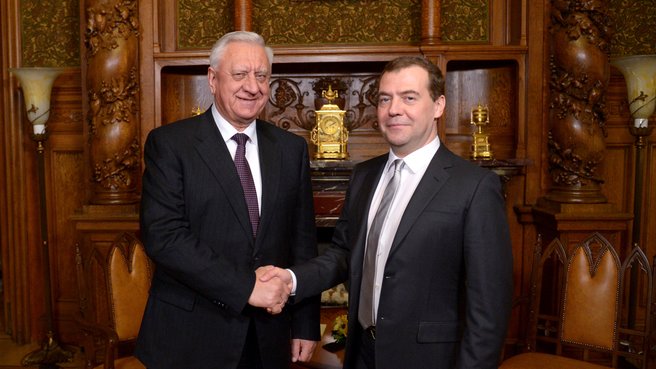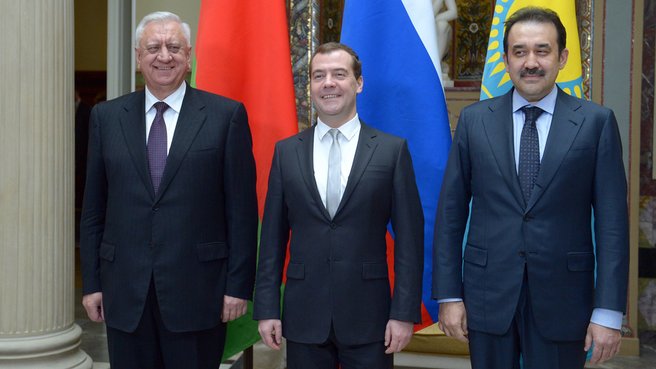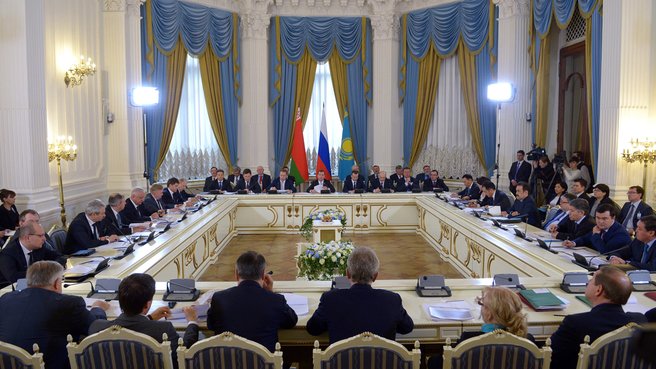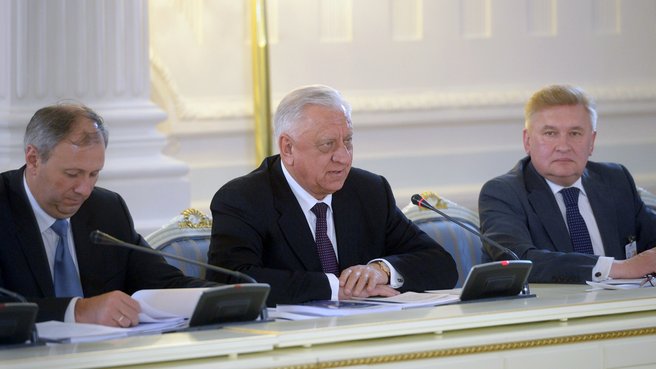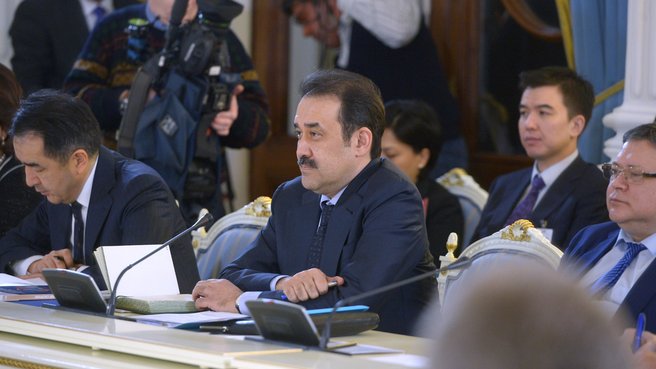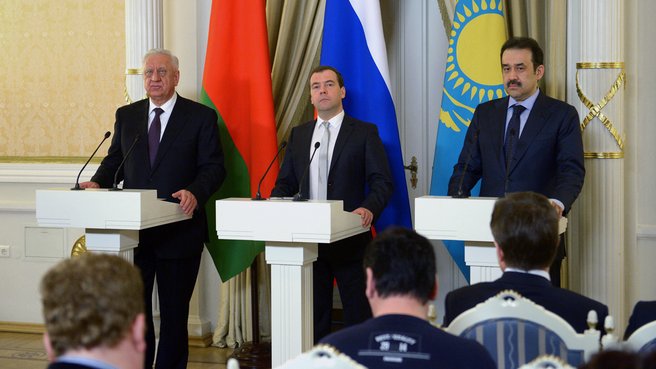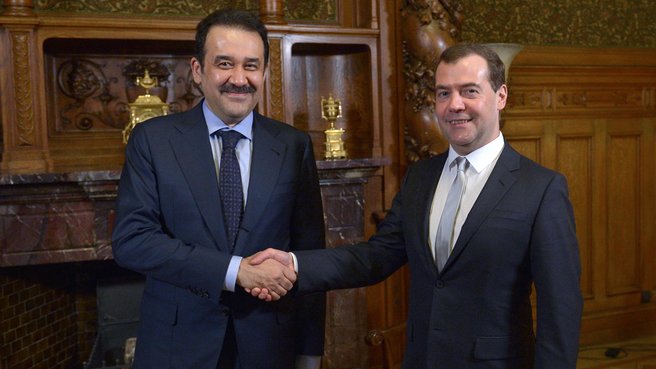Exchange between Dmitry Medvedev and Belarusian Prime Minister Mikhail Myasnikovich
Joint news conference by the prime ministers of Russia, Belarus and Kazakhstan
Exchange between Dmitry Medvedev and Kazakh Prime Minister Karim Massimov
Dmitry Medvedev had a conversation with Prime Minister of Belarus Mikhail Myasnikovich prior to the meeting of heads of governments of Russia, Belarus and Kazakhstan.
Transcript:
Dmitry Medvedev: Welcome, Mr Myasnikovich. We agreed over the phone to schedule this conversation in order to discuss bilateral issues. Today, we, the three prime ministers, will discuss the Customs Union in the lead up to the meeting of presidents and a session of the Supreme Council. With this in mind, I propose that during this private discussion we focus on the performance of our commissions in 2013, as well as the outcomes of and prospects for cooperation between Russia and Belarus. In all, I believe the situation to be reasonably good, although trade turnover declined slightly earlier in the year. I think that we should take notice of this development. There were a number of reasons for it, so we’ll pay special attention to this issue. That said, progress is being made on a number of major projects that we have discussed, which is also worth mentioning as a positive development in our joint efforts. What matters the most, naturally, is that these efforts should pave the way for concrete agreements, the establishment of joint enterprises and the launch of new industrial, energy and agricultural projects aimed at promoting cooperation.
Mikhail Myasnikovich: Thank you, Mr Medvedev. The drafting of the agreement on the establishment of the Eurasian Economic Union is about to enter its final stage with the outstanding issues now falling within the competence of heads of state and government. We will discuss some of them during today’s meeting, which will be followed by a meeting of the heads of state on 29 April in Minsk. I believe that by that time the three states will have begun implementing domestic procedures regarding the draft agreement on the Eurasian Economic Union.
I agree that mutual trade has decelerated slightly, which was especially apparent in early 2014. However, it is not without satisfaction that I can tell you that the market is picking up, with March trade statistics and estimates for April showing that turnover of equipment and agricultural products is on the rise. I’m also glad to see cooperation picking up in terms of investment. In my opinion, this shows that Russian and Belarusian companies have reached their highest level of trust, since they are willing to establish companies aspiring to become international, transnational players.
Thank you for this opportunity to meet with you. I fully agree that we should discuss the issues that you have highlighted.
<…>
***
Dmitry Medvedev’s opening remarks at the meeting of the prime ministers of Russia, Belarus and Kazakhstan:
Good afternoon. We quickly organised this meeting of the prime ministers of the Common Economic Space (CES) in Moscow to discuss current issues, including a very important one – a draft treaty on the Eurasian Economic Union.
Our countries are moving towards the formation of this union. We’ve formed a common customs territory and introduced CES framework agreements. A substantial number of our national powers have been transferred to our partners from the organisation’s supranational body, the Eurasian Economic Commission (something we are still getting used to). Now we are proceeding to an even higher level of integration. Our cooperation in this trilateral format has produced concrete results, such as fewer trade barriers, which can partially make up for the reduction of external demand and alleviate some of the consequences of the financial crisis.
Dmitry Medvedev: "Our countries are moving towards the formation of this union. We’ve formed a common customs territory and introduced CES framework agreements. A substantial number of our national powers have been transferred to our partners from the organisation’s supranational body, the Eurasian Economic Commission (something we are still getting used to). Now we are proceeding to an even higher level of integration."
Last year trade within the Customs Union exceeded $64 billion, which is an impressive figure. But the institutional changes are no less important. The terms of the CES have given businesses the opportunity to locate in places where there are fewer administrative barriers and it is easier to do business. At first glance, this may not seem good for our national interests. However, in the context of the CES, this represents real competition between jurisdictions, which was our goal.
Talks continue on the accession of Armenia and Kyrgyzstan to our union. Our colleagues from these countries have done much to become fully-fledged participants in the integration process. As for the treaty, it should be ready for signing this May, so all negotiating teams need to work hard. We’ve made progress in our effort to coordinate this complicated and lengthy document both in the Government and the Eurasian Economic Commission. The business community actively participated in our discussion. We were able to reach a compromise on most issues and I hope we’ll continue our work in the same vein.
I’d like to point out on Russia’s behalf that we’ll consider all the wishes of our partners and try to take their interests into account as much as we can. We’ve met them halfway in adopting common rules of access to the services of natural monopolies in electric power and the transport of gas, oil and oil products. We’ve agreed to draft indicative balances of gas, oil and oil products and accepted additional exemptions on several sensitive issues.
Dmitry Medvedev: "Last year trade within the Customs Union exceeded $64 billion, which is an impressive figure. But the institutional changes are no less important. The terms of the CES have given businesses the opportunity to locate in places where there are fewer administrative barriers and it is easier to do business. At first glance, this may not seem good for our national interests."
At any rate, we generally proceed from the premise that to achieve results we must work hard and be ready to compromise and find mutually acceptable solutions. I hope that the governments of our three countries and the Eurasian Economic Commission will work in the same spirit. Experts should complete their work on the draft treaty, which requires some finishing touches. We believe it is necessary to impose a moratorium on new proposals and complete the work on the text of the treaty. This is the position of the Russian delegation.
Now I’d like to give the floor to Mr Myasnikovich (Mikhail Myasnikovich, Prime Minister of Belarus). But before I do, I’d like to welcome again, on his and my behalf, Mr Massimov (Karim Massimov, Prime Minister of Kazakhstan) and his new Government and to express our shared desire to work together. We wish all of you, and Mr Massimov personally, success in reaching Kazakhstan’s national goals. Thank you.
<…>
***
Joint news conference by the prime ministers of Russia, Belarus and Kazakhstan
Transcript:
Dmitry Medvedev: Distinguished members of the press, today I had an unscheduled meeting with my counterparts from Belarus and Kazakhstan. We agreed to meet somewhat spontaneously, but I think the meeting was productive. We have been working this entire time on the treaty on the Eurasian Economic Union (EEU). It is due to enter in force on 1 January of next year. This is an important and complex document. It is essential to properly see through the treaty’s drafting, signing by our presidents and subsequent ratification.
The work on its text is nearing completion, but as they say, the devil is in the detail. This is what we dealt with today – the details that have very important economic consequences for all of our countries. First of all, I’d like to thank my colleagues – Mr Myasnikovich and Mr Massimov – for their desire to come to terms, for the opportunities created by their willingness to compromise, and for their ability to listen to and heed each other’s arguments. I hope that this will help our deputy prime ministers to continue this work and polish up some of the treaty’s wording. Later on, this wording will be submitted to the presidents and they will continue discussing it, if need be. I hope we have reached final agreement on some positions that we discussed today and they will not require any additional debate.
I’m convinced that much depends on our cooperation in the current conditions and that our economic integration has enormous potential. The Eurasian Economic Union will greatly expand opportunities for business, joint investment projects and cooperation on external markets. We’ve already spoken about this today because our discussion was devoted to all urgent issues of cooperation, among them the power industry, agriculture and transport. I hope we have found effective solutions for the issues discussed.
Mikhail Myasnikovich: Thank you. Mr Medvedev, Mr Massimov, members of the press.
Today we discussed not only the Eurasian Economic Union but also bilateral issues, and I’m pleased with our open and confidential conversation. We have reached an understanding on virtually all issues and have elaborated the necessary approaches.
Our main subject of discussion was the draft treaty on the Eurasian Economic Union. I think we covered a lot of ground. The main principle of the treaty is to have a truly common market without exemptions or restrictions. We discussed the best ways of forming it, the appropriate timeframe, and what mechanisms to use. I believe we’ve found answers to most questions. It was too difficult to resolve them at the level of the commission or even the council despite the excellent experts they have, because sometimes it is necessary to show political will and the ability to compromise. I think compromise was part of our dialogue today.
I don’t see any insurmountable obstacles although there are many sensitive issues that I hope will be discussed by the heads of state on 29 April in Minsk.
There’s an awareness of the need to create a level playing field for all economic actors so that competition on our common market is fair and so that we are protected in a civilised enough way on the territory we share.
We’ve also had a rather productive conversation, I think, about the importance of the treaty and its appendix containing more regulations with direct applicability rather than referential ones, as well as of making the treaty more workable by avoiding vague, ambiguous wording with more than one possible interpretation. This seems to be another rather serious step in our work on a treaty package that should form the regulatory basis for our full-fledged common market. Thank you.
Karim Massimov: Let me begin by expressing my thanks to Mr Medvedev for having brought us together here so quickly. This is very important, I think, considering that we are on the verge of creating the Eurasian Economic Union. I’d like to once again emphasise the position of Kazakh President Nursultan Nazarbayev that the formation of a Eurasian Economic Union is something we [Kazakhstan] are fully committed to. He first raised the idea back in 1994, during a lecture at Moscow University, and to mark that lecture’s 20th anniversary, Mr Nazarbayev may make an appearance shortly – to do some summing up and to see where we’ve made headway and where there still remain issues to be solved.
In terms of translating into reality all the ideas we’ve discussed today, we can now see that our presidents’ plan to have the treaty signed in the third week of May in Astana is absolutely realistic. A presidential summit is expected to take place in Minsk on 29 April. We can offer mutually acceptable solutions to quite a few issues today, I think, and have that all expressed in legal terms by our deputy prime ministers in finalised documents that will then be sent to the presidents for approval.
It wouldn’t be an overstatement on my part to say that today, we’ve tried to meet one another halfway, to be mindful of each party’s interests – all that in an effort to make it clear to our nations as well as to our companies that the Eurasian Economic Union is a project they will benefit from. Because it will enable us not only to compete with one another but also, by creating a mutually beneficial environment, to find common solutions, including on third markets. That awareness was present today, I think. We tried to be receptive to what each of us was saying. Now it’s up to the commission to properly formalise all these documents. For me personally, I’m satisfied with the decisions we’ve made today. Thank you.
Question: I’ve got a question that could be put to all the prime ministers, I think. There’s been a Eurasian council directive at the presidential level to avoid any commodity exemptions. And earlier today, you said you’d managed to bridge the gap on a lot of issues. But on what specific topics will decisions be left for the heads of state?
Dmitry Medvedev: All negotiations follow their own logic and rules. I hope you don’t expect us to get into which specific provisions remain unsettled, where we need to insert a hyphen or delete a conjunction. Such issues are discussed behind closed doors as they should be. As for main issues, my partners and I would like to emphasise that we’ve made headway on all important and sensitive issues, such as oil and oil products, gas, transport, including automobile and inland shipping, and agriculture. To sum up, today we’ve brought our positions on all major issues closer. I’m referring to practically everything that is important for us and difficult to negotiate and make a final decision on.
I hope that tomorrow, as Mr Massimov has just said, our deputies will finalise the legally binding wording that may become part of the treaty. Then they will be submitted to the presidents for consideration. If the heads of state accept it, I think we can say that we’ve come to terms practically on all positions.
But life is always more complicated, so I don’t want to make any special points. There are some nuances that must be polished up, but nonetheless we’ve made good progress, as my colleagues have just said.
Mikhail Myasnikovich: I think Mr Medvedev has said everything there is to say on this question. I’d just like to add that there was not a single problem that we wouldn’t have discussed or left for the presidents to decide. We’ve discussed all sensitive issues and sought solutions that would be suitable to all, be it on oil, gas, transport or access to pipelines.
Of course, we expect a lot from the Eurasian Economic Union. But it takes time and effort to form fully-fledged relations based on free market principles in the Common Economic Space. We’ve discussed everything and adopted common approaches that we’ll submit for final decisions.
Karim Massimov: I have only one thing to add. The main principle we discussed today, and the decisions we took are based on the belief that if the situation improves in one member country of the planned Eurasian Economic Union, the other two countries will benefit as well. If the Russian economy improves, it will benefit Kazakhstan and Belarus. If the farming and processing industries become more competitive in Belarus, all of us will benefit. If new industries are created in Kazakhstan, for which we are only creating conditions, this will benefit both Belarus and the Russian Federation. It was on this principle of justice and common understanding that our discussion was focused today. I believe that it was a good discussion, and now we must put our decisions on paper so that the heads of state – since our three countries are presidential republics, the final say rests with our presidents – can approve them.
Question: Anton Doroshev from Bloomberg. I have a question about Ukraine for all speakers: Can your countries provide financial assistance to Ukraine? The second question is what do your countries think about the idea of sending UN peacekeeping forces into Ukraine? Mr Medvedev, can I ask you to comment on the beginning of military operations in the Donetsk Region?
Dmitry Medvedev: Regarding assistance to Ukraine. We have been providing large-scale assistance to Ukraine since it became an independent state alongside the other former Soviet republics. I’m not going to cite a lot of figures here. The only thing I will say is that Ukraine has saved more than $100 billion from the discount on our gas prices. These are not phantom but real figures based on calculations. It’s another matter that we did this sincerely, because of our understanding and friendly feelings which we have always had for Ukraine.
Meanwhile, Russia has been developing, and we can no longer build our relations on the principles of fraternal assistance. So, there came a time when we [the government] and our partners in the country had to adopt market pricing principles. I’m talking about this now because we’ve provided this kind of assistance to Ukraine for two decades. I repeat that it adds up to $100 billion.
A short while ago our European partners, specifically [IMF Managing Director] Christine Lagarde, assessed our recent assistance to Ukraine. I am referring to the $3 billion which we loaned to Ukraine by buying Eurobonds from a creditor whose [financial] position has been questionable at the least. That money did much to improve the country’s macroeconomic stability at the time, and these are not my words but the words of the IMF director.
What does this mean? This means that we helped Ukraine before and we are in fact helping it now. Another issue is gas price discounts: one discount was applied on a quarterly basis, another was used to calculate the price and concerned the export customs duties formalised in the agreement signed in Kharkov. Taken together, this adds up to huge sums, which the Ukrainian government could and should have invested in the development of their country and economy. Let’s face it: they did not invest that money as they should have, and now Ukraine’s economy is in a precarious situation. We are aware of this, which is why we are closely monitoring developments in Ukraine irrespective of the political factors. We are sorry for Ukrainians who do not receive their wages and pensions.
As for who should help who, we have been accused of taking decisions that hinder Ukraine’s development and which allegedly have Ukraine by the throat, including decisions on gas pricing. We have a different view of the situation. We say that we helped Ukraine before and we continue to help it now, as I said.
Anyway, those who say that Ukraine needs assistance, that something must be done for it, primarily our European and overseas partners, should act on their words. Let them give Ukraine at least something, but instead they only promise to give Ukraine $1 billion, or $5 billion… Give it something at least! We have issued $3 billion, and we kept gas prices low for a long time. But they [our partners] have not given Ukraine a single rouble, dollar or euro. I believe that now is the time for our European partners and the United States to start doing something for Ukraine and primarily its economy. Stop making secret visits and instructing criminals, and start doing something positive for the development of a country that is very important to us.
What I can say about the hostilities, the involvement of the military and the rest, is that Ukraine is on the brink of civil war, which is terrible. I hope that all the decision makers, including Ukraine’s de facto government, which we do not view as legitimate since it was formed in the aftermath of a coup, will be smart enough to prevent such a terrible shock. The only way to preserve Ukraine and calm tensions is to create normal conditions for the country’s development, engage in dialogue with the population, take into account the interests of all ethnic groups, acknowledge that ethnic Russians have equal rights with ethnic Ukrainians and can thus use their language in everyday life as the second state language. What I mean is that the voices of people from across Ukraine, including the country’s east, centre and south, must be heard. This dialogue is imperative, albeit challenging.
As for the people, they have the right to speak out, just as on Maidan Square, where there were all kinds of people who expressed their opinions in different ways. As we speak, the people in Ukraine’s east are doing the same and they have the right to do so. The de facto authorities should accept this reality and focus on the country instead of relying on various mandates, including that of the United Nations. Peacekeepers rarely bring about tangible solutions. Unfortunately, all they can do is delay the resolution of the conflict.
That’s what I had to say regarding the third part of your question. Colleagues, if you would like to add anything, please go ahead.
Mikhail Myasnikovich: Ukraine is a partner, not just a neighbour for Belarus. We have built our relations with this major European nation on mutually beneficial principles and conditions. Belarus is interested in settling all issues by peaceful means. We believe that they will be able to overcome all the challenges the country is currently facing on their own.
Karim Massimov: Kazakhstan’s position on Ukraine was clearly stated in a statement issued by its Ministry of Foreign Affairs and has not changed since then. We believe that the situation in Ukraine should be resolved in a peaceful manner as soon as possible, bringing about mutually acceptable solutions for all sides of the conflict.
Regarding economic cooperation, I would like to inform you that I had a telephone conversation with acting Prime Minister Yatsenyuk this morning. We discussed the resumption of economic relations between Ukraine and Kazakhstan. An intergovernmental commission could also resume operations taking into account the interests of all parties. Thank you.
***
Following the news conference, Dmitry Medvedev spoke one-on-one with Kazakh Prime Minister Karim Massimov.
